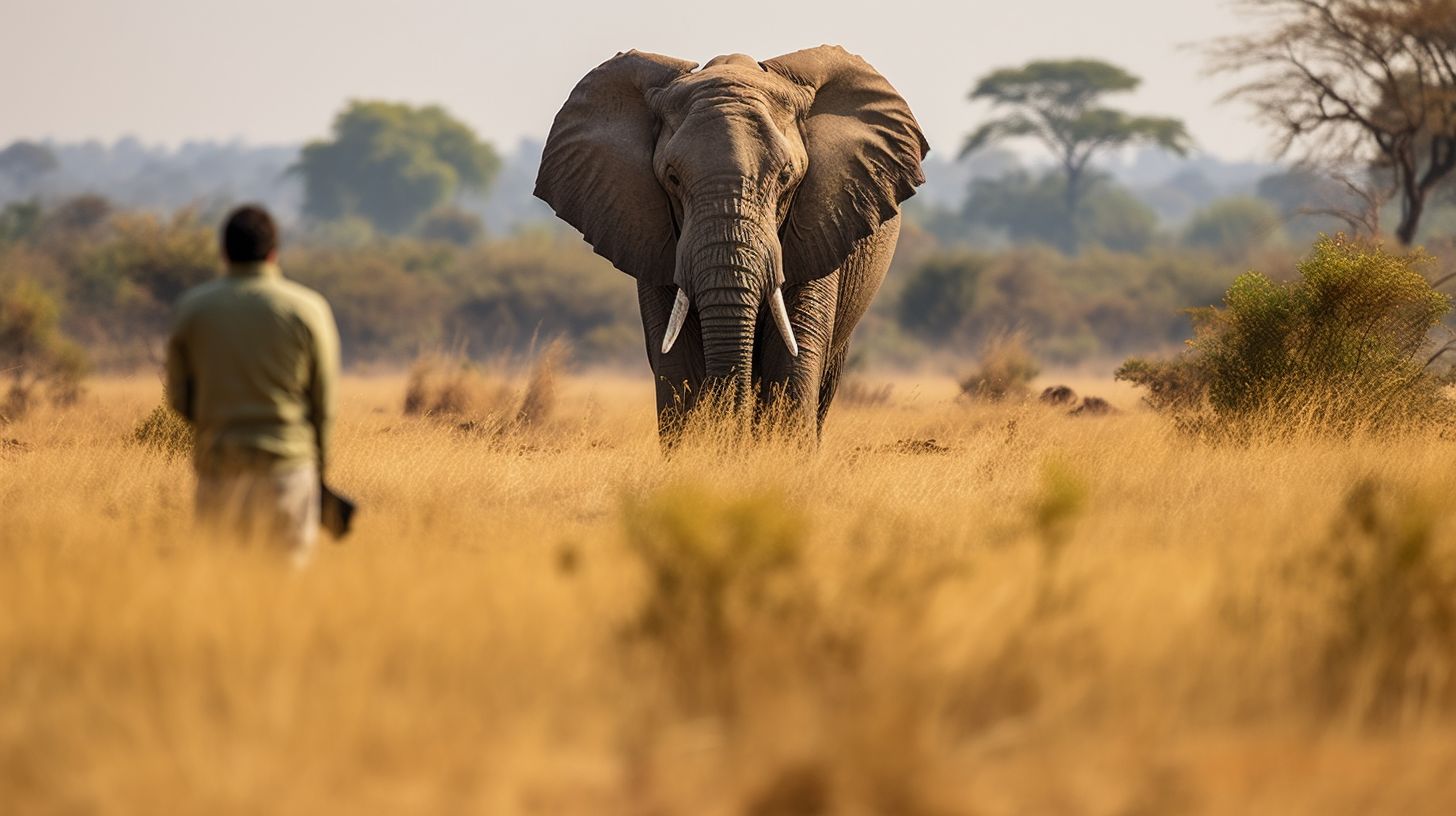
As you plan your dream wildlife adventure, you might wonder how to interact with animals responsibly. Did you know that improper human contact can cause severe stress and harm to wildlife? This post provides essential guidelines for ethical wildlife tourism, ensuring your experience supports animal welfare and conservation.
Dive in to become a savvy traveler who respects our planet’s incredible creatures.
Key Takeaways
- inquire about guide training
- ask about animal emergency procedures
- ask about group sizes during encounters
- inquire how they handle inevitable interactions between tourists and animals
Your choices as a traveler significantly influence ethical practices within the tourism industry – choose wisely to become part of the solution for sustainable wildlife tourism.
Supporting conservation initiatives
Choose your wildlife adventures with a clear conscience by selecting tour operators who pour their heart into conservation. Your travel choices have power; when you book with companies that prioritize ethical practices, you contribute to habitat restoration and the protection of species like the majestic black rhinoceros or playful pink river dolphins.
These responsible businesses often reinvest a portion of their earnings back into local ecosystems, supporting projects that range from anti-poaching efforts to sustainable fishing practices.
Embrace experiences that allow you to witness animals roaming freely in places like Ol Pejeta Conservancy or Amboseli National Park. Such encounters encourage a deeper appreciation for our planet’s incredible biodiversity and fuel positive change by funding on-the-ground conservation work.
Every time you pay for an experience focused on animal welfare rather than exploitation, you cast a vote for a future where tourism coexists harmoniously with nature. Moving beyond individual actions to create collective impact is vital for ensuring that ecotourism benefits both travelers and wildlife alike—leading us toward responsible wildlife encounters where respecting animal welfare takes center stage.
Respecting animal welfare and natural behavior
Supporting conservation initiatives leads to a deeper understanding of the importance of respecting animal welfare and their inherent behaviors. Consider the five freedoms that assess how animals are treated, especially in captivity.
The Five Freedoms = thirst, hunger, distress, discomfort and pain.
It has been widely assumed that when animals are managed with attention specifically focused on the survival-critical negative affects their net affective experience will be positive.
Facilities offering ethical experiences allow wildlife to live as they would without human interference; this includes foraging, socializing, and roaming freely.
When you visit natural habitats, observe from a respectful distance. Interactions should never alter an animal’s behavior—feeding wildlife can make them reliant on human-provided food and might change their natural foraging patterns.
Watch quietly and let them be wild; it’s crucial for their wellbeing and survival. Always opt for experiences that prioritize the animals’ freedom over entertainment value or photo opportunities with wildlife.
"Wildlife deserves a wild life."
Let your travel choices reflect your respect for nature’s balance and contribute to a sustainable future in tourism.
Educating and raising awareness about ethical wildlife interaction
Respect for animal welfare and natural behavior is just the beginning; educating yourself and others about ethical wildlife interaction takes this respect to the next level. By sharing knowledge on proper conduct around animals, you empower travelers to make informed decisions that prioritize conservation and animal protection.
For instance, learning why feeding wild animals disrupts their diet can discourage tourists from causing unintentional harm.
Spread this message by discussing the risks associated with wildlife tourism, such as supporting venues with animal performances or visiting roadside zoos where animals may be bred in captivity and mistreated.
Advocate for spaces like the Elephant Nature Park in Thailand or the Moremi Game Reserve in Botswana, which uphold ethical standards and contribute positively to conservation efforts.
Use your voice on social media platforms to highlight sustainable practices that help protect marine habitats from plastic waste or forests from being littered – it’s a powerful way to influence change within your network while fostering a culture of responsible travel.
Case Studies of Ethical Animal Tourism

Explore how destinations across the globe are setting precedents for responsible wildlife tourism. Discover the transformative experiences provided by sanctuaries and conservation projects that prioritize ethical encounters, ensuring animals thrive in their natural habitats while granting visitors a deeper understanding of the importance of coexistence.
The Elephant Nature Park, Thailand
The Elephant Nature Park in Thailand offers a unique opportunity to interact with elephants ethically and learn about their conservation. This reputable sanctuary provides a safe haven for rescued elephants, allowing them to roam freely in an environment that mimics their natural habitats.
Here, you have the chance to observe these majestic creatures without participating in harmful practices like riding or circus shows.
At this park, education goes hand-in-hand with enjoyment; visitors gain insight into the lives of elephants and the challenges they face in today’s world. Your support helps ensure that these gentle giants receive the care they need while contributing to broader biodiversity conservation efforts.
To participate responsibly in wildlife tourism, it is crucial to choose destinations like The Elephant Nature Park that put animal welfare first.
Learn More About This Experience
Visit Pattaya Elephant Sanctuary in Thailand for an amazing experience with rescued elephants where they are free to interact, forage, roam, and play.
The Galapagos Islands, Ecuador
The Galapagos Islands offer a vibrant tableau where conservation meets curiosity.
Here, you will find yourself stepping into a world where giant tortoises lumber amongst cacti and blue-footed boobies dance without fear of human intrusion. Strict regulations are the guardians of this ecosystem, ensuring that your presence contributes positively to the preservation of a biodiversity hotspot.
Your adventures in the Galapagos should always put wildlife first; choose tours and activities that respect animal habitats and support local conservation efforts. Revel in the opportunity to observe marine iguanas basking on volcanic rocks or swim alongside playful sea lions, but do so at a distance respectful to their space.
Contributing economically to responsible tourism entities not only enriches your travel experience but also aids in safeguarding this natural wonder for generations yet uncharted.
Explore Responsible Galapagos Islands Tour Companies
The amazing variety of beaches and forest habitats means the Islands offer a place for tourists to explore and learn more about these special Islands with the help of guides from the Galapagos National Park.
Community-based marine conservation in the Philippines
Community-based marine conservation in the Philippines takes a unique approach, directly involving local residents in safeguarding their aquatic backyard. These initiatives harness the knowledge and efforts of coastal communities to maintain healthy marine ecosystems.
By participating in activities like reef check dives and sea patrol duties, Filipinos take ownership of their oceanic heritage and work towards its preservation.
These conservation projects also offer travelers an opportunity to experience the underwater world responsibly. Guided snorkeling and diving tours not only reveal a breathtaking array of coral and marine life but also contribute financially to the region’s environmental protection efforts.
Key outcomes include thriving coral reefs, protected endangered species like sea turtles, and improved livelihoods for locals through eco-tourism ventures that embrace sustainable fishing methods.
Your visit thus becomes a compelling force that supports both environmental sustainability and community welfare in equal measure.
Find a responsible Filipino Tour
Visit Pattaya Elephant Sanctuary in Thailand for an amazing experience with rescued elephants where they are free to interact, forage, roam, and play.
4 Best Organizations to Report Animal Cruelty
If you’re ever in.a situation where you see unethical treatment of wildlife, especially when you are you are traveling, you should it report.
If it’s safe, take photos or video of the questionable scene. (But, do so only if you feel safe. Oftentimes the mistreatment of animals are operated by a dangerous underworld. ) You should never directly approach the people in violation because you don’t want to have a confrontation that could lead to your harm; especially in a foreign country.
Here’s a list of places you can report animal cruelty when traveling.
- Born Free Foundation
- World Animal Protection
- International Animal Rescue
- The Sheldrick Wildlife Trust (Rescuing and Rehabilitating Orphaned Elephants and Rhinos)
Our favorite books on Ethical Encounters with Animals for travel
Conclusion
Stepping into the wild, you have the power to protect or disrupt. Choose wisely and travel with a conscience that honors our planet’s incredible creatures. Seek adventures that support wildlife conservation and foster understanding between humans and animals.
Let your journey leave a positive footprint, making each encounter an ethical celebration of nature’s wonders. Go beyond mere observation; become an advocate for responsible wildlife tourism with every choice you make.

Responsible Travel 101
Looking for a comprehensive understanding of this topic? Our white paper is meant to answer your top questions on this subject.
FAQs
1. Why is ethical wildlife tourism important?
Ethical wildlife tourism protects animals from maltreatment, supports their conservation, and promotes sustainable tourism which aligns with zero-waste practices and the three pillars of sustainability.
2. Can I swim with dolphins during my vacation?
Swimming with dolphins may seem fun but often raises ethical issues due to potential stress for dolphins; instead, choose responsible dolphin watching programs that respect their natural behavior.
3. Are there safer alternatives to interacting with exotic cats and prey mammals while traveling?
Rather than close encounters, opt for distance-respectful wildlife observation experiences guided by responsible travel industry standards to prevent distressing the animals and reduce zoonosis risks.
4. Is visiting rehabilitation centers for rescued animals considered ethical tourism?
Yes, supporting reputable rescue centers such as Sheldrick Wildlife Trust or Elephant Transit Home can be a part of ethical tourism if they focus on conservation efforts like reintroducing animals back into safe environments.
5. What are some dos and don’ts when whale-watching?
When going whale watching, maintain a safe distance so as not to disturb the whales’ natural habitat and avoid activities that contribute to bycatch; always prioritize tours committed to great whale preservation without engaging in any hunting practices. Avoid touching wildlife as they may also have diseases that could make you sick or even kill you.
- Always respect animal personal space by observing from a distance and following rules to minimize stress and disruption.
- Do your research before booking tours or activities, choosing ethical options that prioritize wildlife welfare over entertainment.
- Avoid any places that offer physical interaction with wild animals, as this can cause them harm and alter their natural behaviors.
- Support conservation initiatives by selecting tour operators who contribute to habitat protection and environmental sustainability.
- Spread awareness about the importance of responsible wildlife tourism and educate others on how to interact ethically with wildlife.






